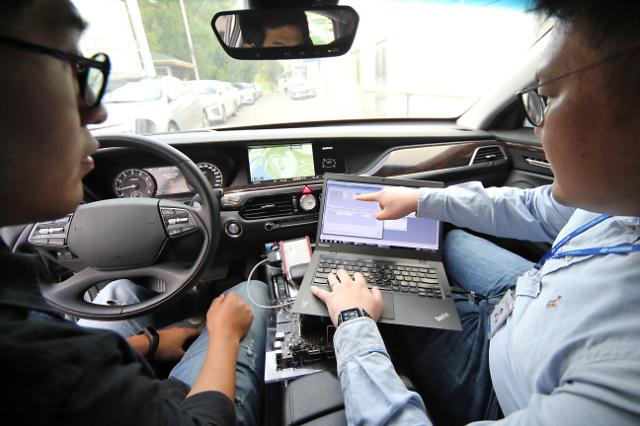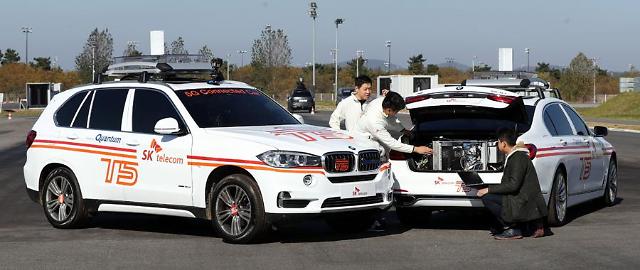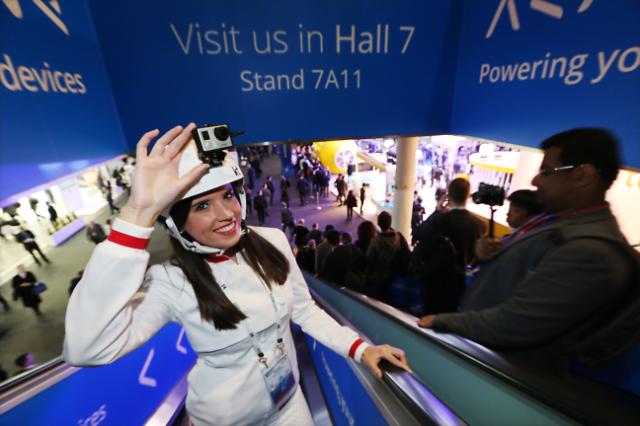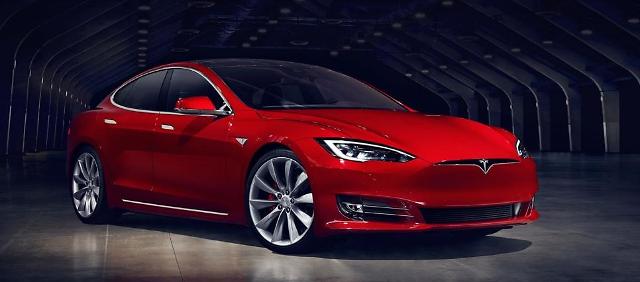
Engineers test a vehicle equipped with connected car technology. [Courtesy of Hyundai Motor]
Competition is growing among Google and other global technology big shots to secure an early foothold in acquiring technology for the connected car industry seen as a cash cow in the future.
The frontrunners in South Korea are Samsung Electronics, Hyundai Motor, and SK Telecom, which have been busy developing big data centers, setting up communication networks and acquiring a connected car system.
Hyundai, the country's top carmaker, disclosed it plans last week to build its first global big data center in China's Guizhou Province mainly for the joint development of connected cars. The center will be used to collect and analyze various transport-related data for the development of connected cars and services.
"By developing big data as an economic growth engine, Guizhou has become an area with infinite potential," Hyundai's vice chairman Chung Eui-sun said.
Connected cars, which can send and receive data to provide driver-friendly features such as autonomous driving as well as optimized features like self-diagnosis, maintenance, and driver customized settings, have become the hot potato.

'T5', a 5G network connected car co-developed by SK Telecom and BMW, is on display Tuesday. [Yonhap Photo]
South Korea's largest mobile carrier SK Telecom (SKT) has something different in mind. The company launched a joint operation with German car giant BMW to develop a connected car based on a 5G network and cooperated with Ericsson, a communications device maker, to build a 5G test network around a test track on Yeongjong Island off the western port of Incheon.
SKT's connected car called "T5", unveiled on Tuesday, will send and receive data with a speed of 20 gigabytes per second. T5 can evade obstacles on the road and engage in real-time communications with traffic lights and security cameras nearby.
"It will take about 18 months to commercialize the 5G network, given the time needed for the establishment of communication standards and the developments of supporting devices," SKT executive vice president Lee Jong Bong told reporters. "We will be the first to succeed in commercializing the 5G network as we introduced the 5G connected car for the first time in the world."
A 5G network is the vital part of connected cars because of its lightning-fast network speed, but it's still in its development phase. Many famous chipmakers and network companies including Nokia and Qualcomm are trying to gain the high ground in the 5G war, while South Korea's state-run telephone company KT Corp. is also trying hard to commercialize it.

A KT coordinator demonstrates 5G live streaming with an action camera at this year's Mobile World Congress in Spain.[Aju News DB]
Samsung took a different approach. The world's largest smartphone maker took a big step Monday into the connected car industry by acquiring Harman International Industries, a US-based global leader in connected car technology, for about eight billion US dollars. Harman provides infotainment and car security systems for BMW and Mercedes-Benz.
"The vehicle of tomorrow will be transformed by smart technology and connectivity in the same way that simple feature phones have become sophisticated smart devices over the past decade," said Samsung president Young Sohn.
"We see substantial long-term growth opportunities in the auto technology market as demand for Samsung's specialized electronic components and solutions continue to grow," he added.
However, South Korean companies are the newcomers in the industry.
Baidu, the Chinese counterpart of Google, has already built and operated big data centers. The Chinese web service giant is collecting driving data and on-road behavioral data to develop an autonomous driving platform of its own.

Tesla's Model 3 provides self-driving and auto-parking features. [Courtesy of Tesla]
Google has tested its self-driving vehicles using data received from its server. Tesla has already unveiled its advanced Autopilot, upgraded from its previous driving assistant feature.
Because connected cars provide self-driving features, it is expected to be adopted by many industries. Public transport, for an example, can use the connected technology to wirelessly control buses and taxis.
nuTonomy, a spin-off technology company of Massachusetts Institute of Technology (MIT), has been testing autonomous taxis in Singapore. Uber has rolled out its own autonomous taxi.
Aju News Park Sae-jin = swatchsjp@ajunews.com

